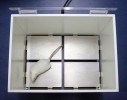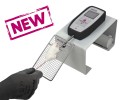Authors
JG Gilet, EL Ivanova, D Trofimova et al
Lab
Institut de Génétique et de Biologie Moléculaire et Cellulaire, Illkirch, France,
Journal
Human Molecular Genetics
Abstract
By using the Cre-mediated genetic switch technology, we were able to successfully generate a conditional knock-in mouse, bearing the KIF2A p.His321Asp missense point variant, identified in a subject with malformations of cortical development. These mice present with neuroanatomical anomalies and microcephaly associated with behavioral deficiencies and susceptibility to epilepsy, correlating with the described human phenotype. Using the flexibility of this model, we investigated RosaCre-, NestinCre- and NexCre-driven expression of the mutation to dissect the pathophysiological mechanisms underlying neurodevelopmental cortical abnormalities. We show that the expression of the p.His321Asp pathogenic variant increases apoptosis and causes abnormal multipolar to bipolar transition in newborn neurons, providing therefore insights to better understand cortical organization and brain growth defects that characterize KIF2A-related human disorders. We further demonstrate that the observed cellular phenotypes are likely to be linked to deficiency in the microtubule depolymerizing function of KIF2A.
BIOSEB Instruments Used:
Aron Test or Four Plates Test (LE830),Grip strength test (BIO-GS3),Rotarod (BX-ROD)

 Pain - Thermal Allodynia / Hyperalgesia
Pain - Thermal Allodynia / Hyperalgesia Pain - Spontaneous Pain - Postural Deficit
Pain - Spontaneous Pain - Postural Deficit Pain - Mechanical Allodynia / Hyperalgesia
Pain - Mechanical Allodynia / Hyperalgesia Learning/Memory - Attention - Addiction
Learning/Memory - Attention - Addiction Physiology & Respiratory Research
Physiology & Respiratory Research
 Pain
Pain Metabolism
Metabolism Motor control
Motor control Neurodegeneration
Neurodegeneration Cross-disciplinary subjects
Cross-disciplinary subjects Muscular system
Muscular system General activity
General activity Mood Disorders
Mood Disorders Other disorders
Other disorders Joints
Joints Central Nervous System (CNS)
Central Nervous System (CNS) Sensory system
Sensory system


